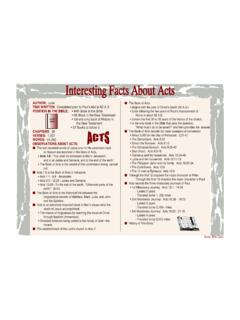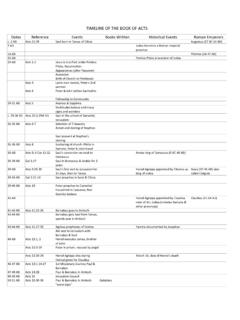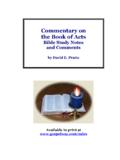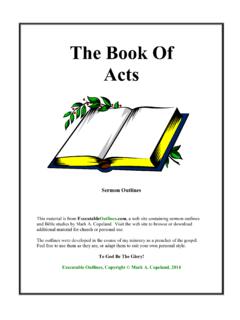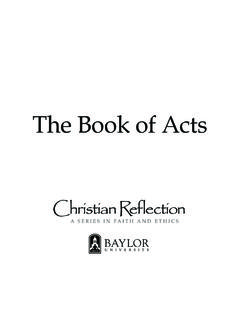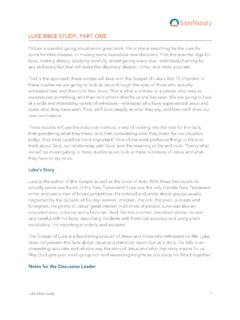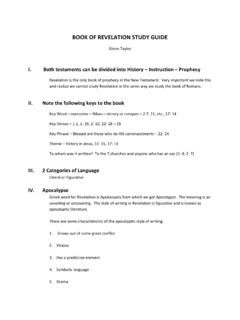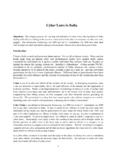Transcription of The Green Book - Zero Anthropology
1 The Green BookMuammar al-Qaddafi1 ContentsThe Solution of the Problem of Democracy: The Au-thority of the People1 The Instrument Of Government72 Parliaments93 The Party134 Class175 Plebiscites216 Popular Conferences And People s Committees237 The Law Of Society278 Who Supervises The Conduct Of Society?319 How Can Society Redirect Its Course When Devia-tions From Its Laws Occur?3310 The Press35 The Solution of the Economic Problem: Socialism11 The Economic Basis Of The Third Universal Theory4112 Need4913 Housing5114 Income5315 Means Of Transportation5516 Land5717 Domestic Servants653 CONTENTSThe Social Basis of The Third Universal Theory18 The Social Basis Of The Third Universal Theory6919 The Family7320 The Tribe7521 The Merits Of The Tribe7722 The Nation7923 Woman8524 Minorities9525 Black People Will Prevail In The World9726 Education9927 Music And Art10128 Sport, Horsemanship And The Stage1034 Part IThe Solution of the Problem ofDemocracy: The Authority of thePeople51 The Instrument Of GovernmentThe instrument of government is the prime political problemconfronting human communities (The problem of the instru-ment of government entails questions of the following form should the exercise of authority assume?)
2 Howought societies to organize themselves politically in the modernworld?)Even conflict within the family is often the result of the failureto resolve this problem of authority. It has clearly become moreserious with the emergence of modern today face this persistent question in new and pressingways. Communities are exposed to the risks of uncertainty, andsuffer the grave consequences of wrong answers. Yet none hassucceeded in answering it conclusively and democratically. THEGREEN book presents the ultimate solution to the problem ofthe proper instrument of political systems in the world today are a product of thestruggle for power between alternative instruments of govern-ment. This struggle may be peaceful or armed, as is evidencedamong classes, sects, tribes, parties or individuals. The outcomeis always the victory of a particular governing structure be itthat of an individual, group, party or class and the defeat ofthe people; the defeat of genuine struggle that results in the victory of a candidatewith, for example,51per cent of the votes leads to a dictato-7 CHAPTER1.
3 THE INSTRUMENT OF GOVERNMENT rial governing body in the guise of a false democracy, since49per cent of the electorate is ruled by an instrument of govern-ment they did not vote for, but which has been imposed uponthem. Such is dictatorship. Besides, this political conflict mayproduce a governing body that represents only a minority. Forwhen votes are distributed among several candidates, thoughone polls more than any other, the sum of the votes received bythose who received fewer votes might well constitute an over-whelming majority. However, the candidate with fewer voteswins and his success is regarded as legitimate and democratic!In actual fact, dictatorship is established under the cover of falsedemocracy. This is the reality of the political systems prevailingin the world today. They are dictatorial systems and it is evidentthat they falsify genuine are the backbone of that conventional democracyprevailing in the world today.
4 Parliament is a misrepresentationof the people, and parliamentary systems are a false solution tothe problem of democracy. A parliament is originally founded torepresent the people, but this in itself is undemocratic as democ-racy means the authority of the people and not an authority act-ing on their behalf. The mere existence of a parliament meansthe absence of the people. True democracy exists only throughthe direct participation of the people, and not through the activ-ity of their representatives. Parliaments have been a legal barrierbetween the people and the exercise of authority, excluding themasses from meaningful politics and monopolizing sovereigntyin their place. People are left with only a facade of democracy,manifested in long queues to cast their election lay bare the character of parliaments, one has to exam-ine their origin. They are either elected from constituencies, aparty, or a coalition of parties, or are appointed.
5 But all of theseprocedures are undemocratic, for dividing the population intoconstituencies means that one member of parliament representsthousands, hundreds of thousands, or millions of people, de-pending on the size of the population. It also means that amember keeps few popular organizational links with the elec-tors since he, like other members, is considered a representa-tive of the whole people. This is what the prevailing traditional9 CHAPTER2. PARLIAMENTS democracy requires. The masses are completely isolated fromthe representative and he, in turn, is totally removed from after winning the electors votes the representativetakes over the people s sovereignty and acts on their behalf. Theprevailing traditional democracy endows the member of parlia-ment with a sacredness and immunity which are denied to therest of the people. Parliaments, therefore, have become a meansof plundering and usurping the authority of the people.
6 It hasthus become the right of the people to struggle, through popu-lar revolution, to destroy such instruments the so-called par-liamentary assemblies which usurp democracy and sovereignty,and which stifle the will of the people. The masses have the rightto proclaim reverberantly the new principle: no representationin lieu of the parliament is formed from one party as a result of its win-ning an election, it becomes a parliament of the winning partyand not of the people. It represents the party and not the peo-ple, and the executive power of the parliament becomes thatof the victorious party and not of the people. The same is trueof the parliament of proportional representation in which eachparty holds a number of seats proportional to their success in thepopular vote. The members of the parliament represent their re-spective parties and not the people, and the power establishedby such a coalition is the power of the combined parties and notthat of the people.
7 Under such systems, the people are the vic-tims whose votes are vied for by exploitative competing factionswho dupe the people into political circuses that are outwardlynoisy and frantic, but inwardly powerless and irrelevant. Alter-natively, the people are seduced into standing in long, apathetic,silent queues to cast their ballots in the same way that they10 CHAPTER2. PARLIAMENTS throw waste paper into dustbins. This is the traditional democ-racy prevalent in the whole world, whether it is represented bya one-party, two-party, multiparty or non-party system. Thus itis clear that representation is a , since the system of elected parliaments is basedon propaganda to win votes, it is a demagogic system in thereal sense of the word. Votes can be bought and falsified. Poorpeople are unable to compete in the election campaigns, and theresult is that only the rich get elected. Assemblies constitutedby appointment or hereditary succession do not fall under anyform of , thinkers, and writers advocated the theory ofrepresentative parliaments at a time when peoples were uncon-sciously herded like sheep by kings, sultans and ultimate aspiration of the people of those times was tohave someone to represent them before such rulers.
8 When eventhis aspiration was rejected, people waged bitter and protractedstruggle to attain this the successful establishment of the age of the republicsand the beginning of the era of the masses, it is unthinkablethat democracy should mean the electing of only a few repre-sentatives to act on behalf of great masses. This is an obsoletestructure. Authority must be in the hands of all of the most tyrannical dictatorships the world has known haveexisted under the aegis of PartyThe party is a contemporary form of dictatorship. It is the mod-ern instrument of dictatorial government. The party is the rule ofa part over the whole. As a party is not an individual, it createsa superficial democracy by establishing assemblies, committees,and propaganda through its members. The party is not a demo-cratic instrument because it is composed only of those peoplewho have common interests, a common perception or a sharedculture; or those who belong to the same region or share thesame belief.
9 They form a party to achieve their ends, imposetheir will, or extend the dominion of their beliefs, values, andinterests to the society as a whole. A party s aim is to achievepower under the pretext of carrying out its program. Democrat-ically, none of these parties should govern a whole people whoconstitute a diversity of interests, ideas, temperaments, regionsand beliefs. The party is a dictatorial instrument of governmentthat enables those with common outlooks or interests to rule thepeople as a whole. Within the community, the party representsa purpose of forming a party is to create an instrument torule the people, , to rule over non-members of the party. Theparty is, fundamentally, based on an arbitrary authoritarian con-cept the domination of the members of the party over the restof the people. The party presupposes that its accession to power13 CHAPTER3. THE PARTYis the way to attain its ends, and assumes that its objectives arealso those of the people.
10 This is the theory justifying party dic-tatorship, and is the basis of any dictatorship. No matter howmany parties exist, the theory remains existence of many parties intensifies the struggle forpower, and this results in the neglect of any achievements for thepeople and of any socially beneficial plans. Such actions are pre-sented as a justification to undermine the position of the rulingparty so that an opposing party can replace it. The parties veryseldom resort to arms in their struggle but, rather, denounce anddenigrate the actions of each other. This is a battle which is in-evitably waged at the expense of the higher, vital interests of thesociety. Some, if not all, of those higher interests will fall preyto the struggle for power between instruments of government,for the destruction of those interests supports the opposition intheir argument against the ruling party or parties. In order torule, the opposition party has to defeat the existing instrumentof do so, the opposition must minimize the government sachievements and cast doubt on its plans, even though thoseplans may be beneficial to the society.
